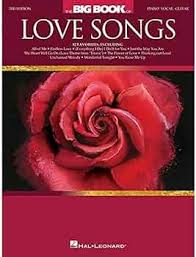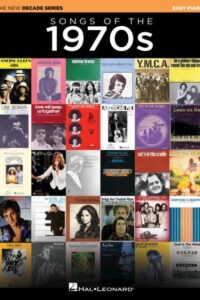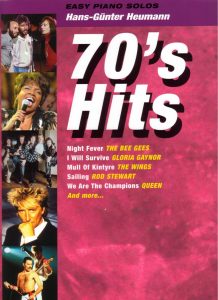Come join us now, and enjoy playing your beloved music and browse through great scores of every level and styles!
Can’t find the songbook you’re looking for? Please, email us at: sheetmusiclibrarypdf@gmail.com We’d like to help you!
Table of Contents

Eric Carmen – Hungry Eyes (Official HD Video)
Best Sheet Music download from our Library.

Please, subscribe to our Sheet Music Library.
If you are already a subscriber, please, check our NEW SCORES’ page every month for new sheet music. THANK YOU!
Remembering Eric Carmen, born on this day in 1949 (1949-2024)
Eric Carmen — exhaustive profile
Eric Carmen (August 11, 1949 – March 10, 2024) was a songwriter, singer, pianist and multi-instrumentalist whose career bridged power-pop (as the lead singer and chief songwriter of the Raspberries) and adult-contemporary soft rock (his solo hits such as “All by Myself” and “Never Gonna Fall in Love Again”). He combined classical piano training with a visceral pop sensibility, producing songs that are at once melodically irresistible and harmonically richer than typical chart fare. This article explores his life, musical style, harmonic approach, improvisational tendencies, influences, legacy, notable works, film and soundtrack connections, and a compact discography and filmography. (Key factual sources: Wikipedia, AllMusic, contemporary obituaries and profiles.) (Viquipèdia, AllMusic, EW.com)
Biography — life and career arc
Eric Howard Carmen was born in Cleveland, Ohio, on August 11, 1949. A child prodigy on piano, he studied classical music at an early age — an education that would later surface in melodic and harmonic quotes from classical repertoire. Carmen’s first notable bands included Cyrus Erie and a Cleveland scene band lineage that eventually led to the formation of the Raspberries in the early 1970s, with Jim Bonfanti, Wally Bryson and others. The Raspberries became a formative American “power pop” group, delivering crunchy guitar hooks, community singalong harmonies and concise, Beatles-influenced songwriting; their single “Go All the Way” became a million-seller and cemented their reputation. After the Raspberries split in 1975, Carmen launched a solo career and scored a major international hit with “All by Myself” (1975). He continued to record and write through the ’70s and ’80s — eventually contributing songs to film soundtracks (notably “Hungry Eyes” on the Dirty Dancing soundtrack and the duet “Almost Paradise” from the Footloose soundtrack) and reuniting with the Raspberries for occasional projects and performances decades later. Carmen died in March 2024; his passing was announced on his official website and reported widely in the press. (case.edu, Viquipèdia, Axios)
Musical style — power pop meets classical-tinged balladry
Eric Carmen’s musical fingerprint is the meeting of two impulses: the bracing immediacy of 1960s pop/rock and an affection for sweeping, late-Romantic harmonic gestures learned in the conservatory. With the Raspberries, Carmen wrote short, high-energy songs that married jangly and distorted guitars with three-part harmonies — a blueprint later cited by many power-pop bands. As a solo artist his sound often moved toward piano-driven balladry, where his classical training shows in the use of modal shifts, suspensions, and extended harmonic motion under otherwise pop-simple melodies.
Two broad stylistic threads recur in his output:
- Pop/rock punch: tight verse/chorus forms, guitar hooks, driving backbeats, and singalong vocal arrangements (Raspberries era). (case.edu)
- Lush piano balladry: sweeping, dramatic dynamics, and harmonic borrowing from classical sources (solo era, particularly “All by Myself”). (Viquipèdia, Classic FM)
Carmen’s voice — clear, emotive, and capable of grit on rockers and pleading tenderness on ballads — allowed him to inhabit both worlds convincingly. (AllMusic)
Improvisational licks and performance habits
Carmen was not primarily known as a jazz or shred improviser; his improvisational choices are best understood in the pop/rock context:
- Piano fills: Carmen’s fills tend to be classical-inflected — arpeggiated figures, figured bass-like left-hand patterns and occasional ornamented scalar runs that emphasize emotional punctuation rather than virtuoso exhibition. On tracks like “All by Myself” and “Boats Against the Current” he uses wide-spaced arpeggios and dynamic swells to heighten drama. (Viquipèdia)
- Guitar licks: In Raspberries songs he favored concise, melodic guitar hooks and harmonized guitar lines (often in thirds), rather than extended solos. The single “Go All the Way” is a good example of a riff that functions both as a hook and a structural linchpin. (case.edu)
- Vocal ad-libbing: Live, Carmen would ornament vocal lines with added melisma at climactic moments, and sometimes engage in call-and-response with backing vocalists — a hallmark of the pop-chorus tradition.
Overall, his “improvisation” is economical and song-serving: small variations, emotional inflection, and instrumental color rather than long solo flights.
Chord progressions and harmonic tendencies
Carmen’s harmonic language is more adventurous than much contemporary pop, especially in his ballads where classical sources come into play.
The Rachmaninoff connection — “All by Myself”
The most famous example is “All by Myself” (1975). The verse borrows directly from the Adagio sostenuto of Sergei Rachmaninoff’s Piano Concerto No. 2 (second movement). Carmen adapted the theme and built a pop ballad around its Romantic harmonic motion: i → V/V → V → I-style cadences and rich expressive chordal shifts that create a sense of unresolved longing. Using a late-Romantic progression under a pop vocal melody gives the song a cinematic quality while remaining structurally simple enough for mainstream radio. (This borrowing is well documented and credited in many write-ups.) (Viquipèdia, Classic FM)
Pop-rock progressions
On Raspberries records Carmen often used variations on the I–IV–V palette but added modal interchange, secondary dominants, and relative minor detours to add color. For example, the bright major-key choruses often give way to a bridge or middle eight that introduces chromatic mediants or IV → iv (major to minor subdominant) shifts — a device that heightens emotional contrast.
Ballad textures
Carmen favored:
- Pedal point basses under shifting upper-chord extensions (creating a suspended, yearning feeling).
- Use of tonic minor → tonic major shifts (parallel modes) for emotional contrast.
- Suspended chords and added-tone voicings (add9, maj7) that give his ballads a slightly jazz-tinged color without leaving pop harmony.
Taken together, these tendencies make his songs sound richer than many contemporaneous AM-radio hits while remaining immediately accessible. (AllMusic, Classic FM)
Influences

Carmen explicitly and implicitly drew from several sources:
- The Beatles and 1960s British Invasion: The Raspberries were often described as heirs to the Beatles’ melodic sensibility and studio approach, especially in their vocal harmonies and concise pop craft. (case.edu)
- The Who, The Beach Boys: For power and layered harmonies respectively; Carmen sought to rekindle the energy and harmonic sophistication of those groups. (case.edu)
- Classical composers: Most visibly, Rachmaninoff informed “All by Myself”; Carmen’s early training shows up as classical motifs and dynamic structure in ballads. (Viquipèdia, Classic FM)
- Contemporary singer-songwriters: As his solo career matured he absorbed the lush adult-contemporary production aesthetics of the late ’70s and ’80s.
These combined influences explain Carmen’s unique position between the crunchy, guitar-forward power pop of his band years and the pastoral, piano-driven adult pop of his solo hits.

Signature works and most-known compositions
A concise list of his most enduring songs and why they matter:
- “Go All the Way” (with the Raspberries, 1972) — A power-pop classic: tight, hooky, and commercially successful; it became the band’s signature tune. (case.edu)
- “All by Myself” (1975) — Carmen’s biggest solo hit; its Rachmaninoff link and its soaring chorus made it an international standard and the source of later covers (notably Celine Dion). It remains one of the definitive power ballads of the 1970s. (Viquipèdia)
- “Never Gonna Fall in Love Again” (1976) — Another top-ten solo single demonstrating Carmen’s gift for tragic, melodically simple but harmonically clever ballads. (AllMusic)
- “Hungry Eyes” (1987) — Performed by Carmen but written by Franke Previte and John DeNicola for the Dirty Dancing soundtrack — it became a huge late-’80s hit and introduced Carmen to a new generation. (Viquipèdia)
- “Almost Paradise” (1987) — A duet (performed by Mike Reno and Ann Wilson) that Carmen co-wrote; featured on the Footloose soundtrack and widely played on adult contemporary radio. (AllMusic)
These tracks span two decades and multiple pop contexts, speaking to Carmen’s flexibility as a writer and performer.
Discography (highlights)

Major solo studio albums and notable Raspberries records (select list, not exhaustive):
With the Raspberries
- Raspberries (1972) — includes “Go All the Way.” (case.edu)
- Fresh (1972)
- Side 3 (1973)
- Starting Over (1974)
Solo
- Eric Carmen (1975) — features “All by Myself.” (AllMusic)
- Boats Against the Current (1977) — title nods to literary and nostalgic sentiments; lush arrangements. (AllMusic)
- Change of Heart (1978)
- Tonight You’re Mine (1980)
- The Best of Eric Carmen / compilation releases and later collections (including The Essential Eric Carmen released in the 2010s). (Discogs, AllMusic)
For a full discography (singles, compilation appearances, soundtrack credits and session work) see catalog listings on AllMusic and Discogs. (AllMusic, Discogs)
Filmography and soundtrack contributions
Eric Carmen’s direct film appearances were limited, but his songs are strongly associated with film soundtracks which increased their cultural reach:
- Dirty Dancing (1987) — Carmen’s recording of “Hungry Eyes” features on the soundtrack; the soundtrack’s massive success gave the song renewed life and mainstream radio play. (Viquipèdia)
- Footloose (1984) — Carmen co-wrote (with others) songs that appeared in soundtrack contexts; his songwriting contributions to film soundtracks (including “Almost Paradise”) helped him reach wider audiences. (AllMusic)
- Pop culture placements — “All by Myself” has been used in film and television (for example, memorable placements in comedies and romantic dramas), further extending Carmen’s influence across media. (Viquipèdia)
Legacy and influence
Eric Carmen’s legacy is multifaceted:
- Power-pop lineage: The Raspberries are frequently cited as early architects of American power pop; their blend of melodic immediacy and rock energy influenced later acts in the genre. (case.edu)
- Ballad craft: As a solo artist, Carmen wrote ballads that combined pop accessibility with classical harmonic color — an approach that elevated the emotional reach of mainstream pop songwriting. “All by Myself” alone secured his place in the canon of power ballads, and its later covers kept the song in public consciousness for decades. (Viquipèdia)
- Soundtrack resurgence: Inclusion of his songs on blockbuster soundtracks (Dirty Dancing, Footloose, Guardians of the Galaxy via Raspberries placements) introduced the work to new generations. (goldminemag.com)
- Critical reevaluation: While never the most visible star of his era, Carmen earned praise from peers (Paul Stanley and others) and critics for his songwriting craft and melodic gifts; retrospective profiles and obituaries since his death in 2024 underscore his underestimated influence. (Axios, goldminemag.com)
Notable performances and later years
Carmen toured in various configurations — with the Raspberries during their early-1970s heyday, and he participated in reunions and anniversary performances in the 2000s. He also performed with and alongside other luminaries (he appeared with Ringo Starr & His All-Starr Band at one point), underscoring the respect he held among fellow musicians. In his later years Carmen continued to release music sporadically and to compile definitive collections of his work. His death in March 2024 was marked by tributes from across the music press and reminders of the wide emotional range of his catalog. (The Classic Rocker, EW.com)

Technical takeaways for musicians who want to “sound like Carmen”
- Piano voicings: Use root-less voiced chords (e.g., left hand outlines the bass while the right hand plays rich thirds/sevenths and add9s). Add occasional Rachmaninoff-style arpeggiations in the left hand for drama. (Classic FM)
- Melodic writing: Aim for singable, slightly plaintive melodies that sit comfortably over shifting harmonies; short, memorable hooks are essential. (AllMusic)
- Harmonic moves: Borrow from classical cadential motion (secondary dominants, chromatic mediants, modal interchange IV→iv) to create unexpected emotional twists within a pop form. (Classic FM)
- Arrangement: Balance intimate piano/vocal sections with fuller band choruses; dynamic contrast is a Carmen hallmark.
Closing — why Eric Carmen still matters
Eric Carmen built a bridge between two musical worlds: the compact, hook-driven craft of power pop and the sweeping, emotionally capacious language of classical-informed balladry. That synthesis yielded songs that are at once immediate (radio-friendly) and harmonically rich — a rare combination that explains both the longevity of his hits and the admiration of fellow musicians. His tunes continue to be covered, placed in films and rediscovered by new listeners; his influence runs quietly but broadly through pop songwriting that prizes melody and emotional honesty.

Selected references and suggested further reading
- Eric Carmen — Wikipedia. (Viquipèdia)
- AllMusic artist page: Eric Carmen. (AllMusic)
- “All by Myself” — song page (Rachmaninoff connection). (Viquipèdia, Classic FM)
- Raspberries — Encyclopedia of Cleveland History. (case.edu)
- Contemporary obituaries and retrospectives (EW, CNN, Axios, Goldmine). (EW.com, News Channel 3-12, Axios, goldminemag.com)
Browse in the Library:
Or browse in the categories menus & download the Library Catalog PDF:
